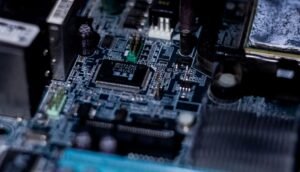Where Artificial Intelligence Can Be Used
Artificial Intelligence (AI) has become an integral part of our lives, with its applications spanning across various sectors. From virtual assistants like Siri and Alexa to self-driving cars and data analysis automation, AI has made rapid advancements in recent years. In this article, we will explore some of the key areas where AI can be effectively utilized to enhance efficiency and improve overall outcomes.
Key Takeaways
- AI can be used in various sectors, including healthcare, finance, manufacturing, and marketing.
- AI enables automation, data analysis, decision-making support, and improved customer experiences.
- The use of AI is increasing exponentially, with more companies integrating AI technologies into their operations.
Artificial Intelligence can revolutionize the healthcare industry by enabling faster diagnosis through analyzing medical images, predicting disease progression, and personalizing treatment plans. *AI-powered robots and chatbots can also provide assistance and support to patients and healthcare professionals, improving overall patient care.
*AI technology in finance can help optimize financial portfolios, detect fraud, and provide accurate risk assessments. Predictive analytics leverages data patterns to forecast market trends and make informed investment decisions.
In the manufacturing sector, AI can enhance production processes, improve supply chain management, and facilitate predictive maintenance. Smart robots powered by AI can perform repetitive tasks with precision, while predictive maintenance helps identify machinery issues and minimize downtime. *AI can also enable smart inventory management, ensuring efficient resource allocation.
*AI has greatly transformed the field of marketing by enabling targeted advertising, personalized recommendations, and chatbot-based customer support. Sentiment analysis helps gauge consumer sentiments towards products or services, aiding in better decision-making.
Applications of Artificial Intelligence
| Sector | AI Applications |
|---|---|
| Healthcare | Medical image analysis, disease prediction, robot-assisted surgery |
| Finance | Portfolio optimization, fraud detection, risk assessment |
| Manufacturing | Production enhancement, supply chain management, predictive maintenance |
AI has even found applications in education, where it can personalize learning experiences, provide virtual tutoring, and offer educational recommendations based on individual preferences. Machine learning algorithms adapt to each student’s needs, ensuring tailored instruction.
In the transportation sector, AI is utilized in self-driving cars to improve road safety and optimize traffic management systems. Intelligent routing systems help reduce commute times and enhance overall transportation efficiency.
*AI-powered virtual assistants like Siri, Alexa, and Google Assistant have transformed the way we interact with technology and access information. These virtual assistants can perform tasks, answer questions, and provide recommendations, making our lives more convenient.
Data-Driven AI
| Sector | Data Utilization |
|---|---|
| Marketing | Consumer behavior analysis, personalized recommendations, targeted advertising |
| Education | Personalized learning, adaptive tutoring, educational content recommendation |
| Transportation | Traffic optimization, intelligent routing, self-driving cars |
As the field of AI continues to advance, more sectors will benefit from its applications. The potential of AI is vast, and integration into various industries will pave the way for increased efficiency and improved outcomes. *It is important for businesses and individuals to stay updated with the latest advancements in AI to leverage its potential and stay ahead.
With AI rapidly evolving and finding applications across diverse sectors, it is evident that integrating AI technologies can lead to significant advancements. It is crucial for businesses and industries to embrace AI’s potential and explore the multitude of benefits it offers. By harnessing the power of AI, we can revolutionize the way we operate and continuously drive innovation in the modern world.

Common Misconceptions
Artificial Intelligence is limited to tech-related industries
One common misconception about artificial intelligence (AI) is that it can only be used in technology-related industries. However, the applications of AI extend far beyond just the tech sector.
- AI can be used in healthcare to aid in diagnostics and treatment recommendations.
- AI can be applied in finance to predict market trends and make investment strategies.
- AI can be used in transportation to optimize routes and reduce fuel consumption.
AI will lead to massive job loss
Another misconception is that AI will lead to widespread unemployment as machines replace human workers. While it is true that AI has the potential to automate certain tasks, it also creates new job opportunities and can enhance productivity.
- AI can create new jobs in the field of developing and maintaining AI systems.
- AI can free up human workers from repetitive tasks, allowing them to focus on more complex and creative work.
- AI can improve job safety by taking over hazardous tasks that are risky for humans.
AI is only for large companies with big budgets
Many people believe that implementing AI is only feasible for large corporations with substantial financial resources. However, the cost of AI technologies has been decreasing, and there are options available for businesses of all sizes.
- There are open-source AI frameworks and tools that can be used by smaller businesses with limited budgets.
- Cloud-based AI services are cost-effective and scalable, making them accessible to businesses of any size.
- AI can help small businesses be more competitive by automating tasks and improving efficiency.
AI is only about robots and human-like machines
Many people associate AI with robots and human-like machines due to popular culture portrayals. However, AI encompasses a wide range of technologies and applications beyond physical embodiments.
- AI can be invisible, such as in recommendation systems used by e-commerce websites.
- AI can be present in software applications, like virtual assistants and chatbots.
- AI can also exist in data analytics tools that use machine learning algorithms to identify patterns and make predictions.
AI is fully capable of human-like decision making
Contrary to popular belief, AI is still far from achieving human-like decision-making capabilities. While AI can process vast amounts of data and perform complex tasks, it lacks the inherent understanding and intuition that humans possess.
- AI may struggle with nuanced situations that require abstract reasoning.
- AI can make mistakes if trained on biased datasets or if the algorithms are flawed.
- Human oversight and intervention are crucial to ensure ethical decision making and prevent AI-driven errors.

Applications of Artificial Intelligence in Healthcare
Artificial Intelligence (AI) has revolutionized various industries, and healthcare is no exception. With its ability to analyze large amounts of data, make accurate predictions, and provide personalized care, AI is being embraced in several healthcare applications. The table below highlights some of the key areas where AI is playing a significant role in advancing healthcare.
| Application | Description | Benefits |
|---|---|---|
| Diagnosis | AI algorithms assist doctors in diagnosing medical conditions by analyzing symptoms and medical images. | Enhanced accuracy, reduced misdiagnosis |
| Drug Discovery | AI helps identify potential drug candidates by analyzing vast amounts of molecular information. | Accelerated research, more efficient drug development |
| Remote Patient Monitoring | AI-powered sensors and wearables enable continuous monitoring of patients outside of traditional healthcare settings. | Early detection, improved patient outcomes |
| Genomics | AI assists in genomic data analysis, enabling personalized medicine based on an individual’s genetic profile. | Tailored treatment, increased precision |
Applications of Artificial Intelligence in Banking and Finance
Artificial Intelligence has significantly transformed the banking and finance sector, bringing automation, fraud detection, and personalized customer experiences to the forefront. The following table delves into some key applications of AI in the financial industry.
| Application | Description | Benefits |
|---|---|---|
| Chatbots | AI-powered chatbots provide customer support, answer queries, and offer real-time assistance. | 24/7 availability, improved customer service |
| Risk Assessment | AI algorithms analyze data to assess credit risk, fight fraud, and identify irregularities. | Efficient risk management, reduced fraud |
| Algorithmic Trading | AI systems analyze vast amounts of financial data to make predictions and automate trading decisions. | Increased efficiency, improved trading outcomes |
| Personalized Financial Advice | AI platforms recommend tailored financial products and investment strategies based on individual goals and risk tolerance. | Improved financial planning, better decision-making |
Applications of Artificial Intelligence in Transportation
Artificial Intelligence has revolutionized the transportation industry, making vehicles smarter, routes more efficient, and travel safer. The table below showcases some key applications of AI in transportation.
| Application | Description | Benefits |
|---|---|---|
| Autonomous Vehicles | AI enables self-driving cars and trucks, reducing human errors and enhancing road safety. | Reduced accidents, improved traffic flow |
| Traffic Management | AI algorithms optimize traffic flow, predict congestion, and suggest alternative routes. | Reduced commute times, improved efficiency |
| Ride-Sharing Services | AI-based platforms match riders and drivers, optimize routes, and provide real-time ETAs. | Convenient travel, reduced congestion |
| Smart Infrastructure | AI sensors and systems monitor roads, bridges, and transportation infrastructure for maintenance and safety. | Early detection of issues, improved infrastructure management |
Applications of Artificial Intelligence in Retail
Artificial Intelligence innovations have reshaped the retail industry, transforming the way businesses interact with customers, optimize supply chains, and enhance overall shopping experiences. Explore the table below to uncover some notable applications of AI in the retail sector.
| Application | Description | Benefits |
|---|---|---|
| Personalized Recommendations | AI-driven recommendation engines provide personalized product suggestions based on customer preferences and behavior. | Improved customer satisfaction, increased sales |
| Inventory Management | AI systems analyze purchasing trends, optimize stock levels, and automate inventory replenishment. | Reduced stockouts, minimized holding costs |
| Virtual Shopping Assistants | AI-powered virtual assistants guide and assist customers in their shopping journey. | Enhanced shopping experience, increased engagement |
| Fraud Detection | AI algorithms analyze transaction data to identify patterns of fraudulent activity and protect against cyber threats. | Reduced fraud losses, enhanced security |
Applications of Artificial Intelligence in Education
Artificial Intelligence has immense potential to revolutionize education by personalizing learning, providing intelligent tutoring, and automating administrative tasks. The table presented below highlights some key applications of AI in the field of education.
| Application | Description | Benefits |
|---|---|---|
| Intelligent Tutoring Systems | AI-powered tutoring systems adapt instructional content based on individual student needs and performance. | Personalized learning, increased engagement |
| Automated Grading | AI algorithms automatically grade assignments, saving teachers time and providing immediate feedback to students. | Efficient assessment, timely feedback |
| Virtual Reality in Education | AI-driven virtual reality platforms offer immersive educational experiences, bringing complex subjects to life. | Enhanced understanding, improved retention |
| Educational Analytics | AI analyzes student data to identify learning gaps, provide learning recommendations, and enhance teaching methodologies. | Improved academic outcomes, data-driven insights |
Applications of Artificial Intelligence in Entertainment
Artificial Intelligence serves as a catalyst for innovation and creativity in the entertainment industry, enhancing content creation, recommendation engines, and audience engagement. The table below showcases some intriguing applications of AI in the realm of entertainment.
| Application | Description | Benefits |
|---|---|---|
| Content Generation | AI algorithms generate news articles, music, and artwork, revolutionizing content creation processes. | Infinite creative possibilities, increased productivity |
| Personalized Content Recommendations | AI-powered recommendation systems suggest movies, TV shows, and music based on individual preferences. | Enhanced user experience, increased engagement |
| Augmented Reality Experiences | AI-driven augmented reality technologies offer dynamic and interactive experiences to entertain and engage audiences. | Immersive entertainment, innovative storytelling |
| Emotion Analysis | AI systems analyze audience reactions during concerts, movies, or live events to optimize performances and experiences. | Improved audience satisfaction, tailored experiences |
Applications of Artificial Intelligence in Manufacturing
Artificial Intelligence plays a pivotal role in revolutionizing the manufacturing industry, optimizing production processes, predictive maintenance, and quality control. Explore the table below to uncover some notable applications of AI in the manufacturing sector.
| Application | Description | Benefits |
|---|---|---|
| Predictive Maintenance | AI algorithms analyze equipment sensor data to predict maintenance needs, minimizing downtime and maximizing efficiency. | Reduced maintenance costs, increased operational uptime |
| Quality Control | AI systems inspect products for defects and deviations from specifications, ensuring superior product quality. | Improved product quality, reduced waste |
| Supply Chain Optimization | AI algorithms optimize supply chain operations, enabling efficient inventory management and demand forecasting. | Efficient resource allocation, reduced costs |
| Robotics and Automation | AI-powered robots automate repetitive tasks, improving productivity and ensuring consistent output quality. | Increased efficiency, reduced human errors |
Applications of Artificial Intelligence in Agriculture
The use of Artificial Intelligence in agriculture has the potential to address challenges such as optimizing crop yields, reducing resource usage, and increasing sustainable farming practices. The table below highlights some key applications of AI in the field of agriculture.
| Application | Description | Benefits |
|---|---|---|
| Precision Farming | AI systems analyze real-time data from sensors and drones to optimize irrigation, fertilization, and pest control. | Increased crop yields, reduced resource waste |
| Plant Disease Detection | AI algorithms identify plant diseases through image recognition, helping farmers take timely preventive measures. | Early disease detection, reduced crop losses |
| Crop Monitoring | AI-powered analytics monitor crop growth, predicting yield and enabling efficient farm management. | Improved crop planning, optimized resource allocation |
| Smart Irrigation | AI systems analyze environmental data to optimize irrigation schedules, minimizing water usage and conserving resources. | Water conservation, cost savings |
Applications of Artificial Intelligence in Energy
Artificial Intelligence is revolutionizing the energy sector, facilitating efficient energy management, optimizing renewable energy sources, and improving grid systems. The table below showcases some notable applications of AI in the field of energy.
| Application | Description | Benefits |
|---|---|---|
| Energy Grid Optimization | AI algorithms analyze data from energy grids to optimize energy distribution, enhance grid stability, and reduce blackouts. | Improved energy efficiency, reduced downtime |
| Renewable Energy Forecasting | AI models analyze climate and historical data to predict renewable energy output, optimizing energy generation and consumption. | Enhanced energy planning, reduced reliance on non-renewables |
| Smart Home Energy Management | AI controls and monitors energy usage in homes, adjusting consumption based on time-of-use pricing and user preferences. | Reduced energy bills, increased sustainability |
| Energy Demand Response | AI systems analyze real-time data and adjust energy usage to match supply and demand, ensuring grid stability. | Efficient energy utilization, reduced peak demand |
Artificial Intelligence has become a transformative force across various industries, including healthcare, banking, transportation, retail, education, entertainment, manufacturing, agriculture, and energy. With its ability to process vast amounts of data and make intelligent predictions, AI is unlocking new opportunities, improving efficiency, and enhancing user experiences. As organizations continue to embrace AI, it is crucial to understand its vast potential and the variety of ways it can be utilized to drive innovation and positive change.
Frequently Asked Questions
Where Artificial Intelligence Can Be Used




